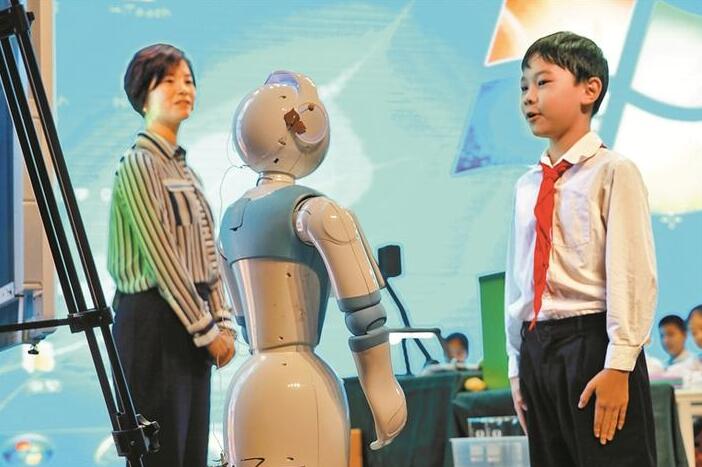Information technology upgrades education reform, innovation

An AI robot interacts with a student at a mathematics class at a primary school in Futian District, Shenzhen, during a nationwide classroom presentation activity held from March 20 to 24.
In today’s era, modern information technologies like the internet, big data, and artificial intelligence have profoundly changed the way people work, learn and live. At the same time, the revolutionary impact on education has become increasingly prominent. Learning environments, teaching models and the governance of education systems are facing opportunities and challenges in the transformation.
From March 18 to 20, the “Third China-US Smart Education Conference” was held in Beijing. Well-known experts from the field of education and technology in China and the United States held in-depth discussions on the frontiers of AI 2.0 and education informatization 2.0. The conference also released the 2018 China Vocational Education Technology Outlook: Horizon Project Report.
In the field of education, virtual reality will reshape people’s learning styles using multimedia and computer teaching, and it will revolutionize the entire education field, said Zhao Qinping, an academician from the Chinese Academy of Engineering. He added that the use of virtual reality can facilitate educational resources sharing across regions and borders, and that virtual reality will become a promising new technology in the field of education.
Zhong Binglin, president of the China Education Association, said that the teaching and learning methods represented by the Massive Open Online Courses (MOOCs) platform have broken the limitations of time and space and allowing learners to personalize their online education, which is conducive to the independent and cooperative learning of students. At the same time, it has created the conditions for integrating online teaching and offline education as well as reforming teaching methods.
Zheng Yonghe, director of the Policy Bureau of the National Natural Science Foundation of China, said education is shifting from scale to individualization, from a knowledge-centered model to a learner-oriented one, and from an emphasis on results to a focus on processes and capabilities. Educational rules have changed from empiricism to scientism. Information technology may greatly advance education equity.
Smart education is a system of educational behavior provided by schools, regions or countries with high learning experience, content adaptability and teaching efficiency. It is a high-end form of education informatization, including a smart learning environment, a new teaching model and a modernized education system. The development of smart education requires the integration of information technology into the entire process of education, in order to realize the structural changes in education.
Dong Qi, president of Beijing Normal University, proposed that in order to achieve the deep integration and application of information technology in the education field, it is necessary to study the corresponding policies and current methods of traditional teaching behaviors. It is also crucial to increase human and financial input to help students change the traditional way of learning.
(edited by CHEN MIRONG)

 PRINT
PRINT CLOSE
CLOSE